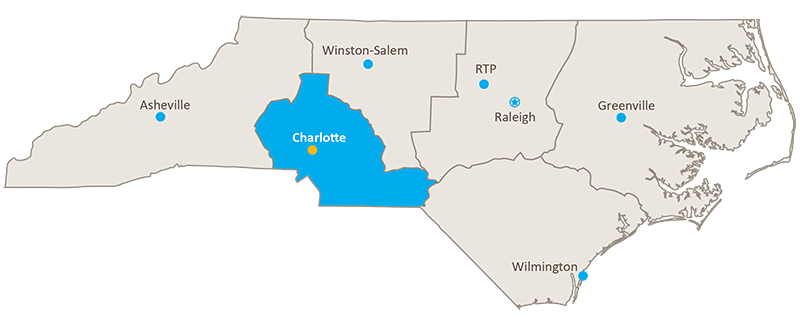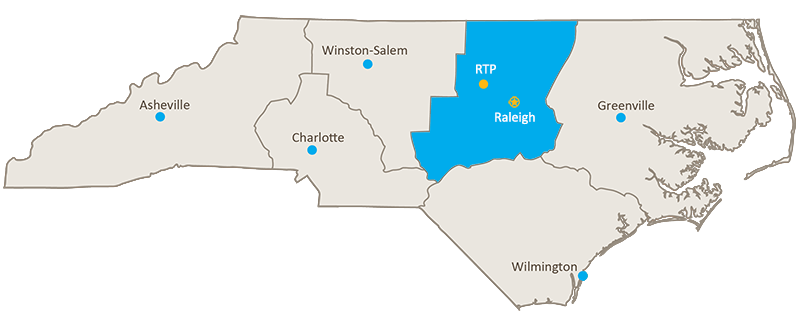
Shared Research Facilities and Equipment
Many facilities across North Carolina support life sciences research.
The listing covers core laboratory facilities at university and nonprofit research institutions that are open to researchers or collaborators outside of their home institutions.
Representatives of the core facilities listed below have voluntarily submitted their information. Not all institutions list available core lab facilities, but many are in the process of organizing and compiling these resources. As this information becomes available, we'll add those links.
NCBiotech has funded equipment in many core facilities in the state.
The Center's ongoing role is to provide this information portal. If you would like to submit a new listing or update an existing listing please fill this form.
The computational Modeling Core includes Cray XC-30 Supercomputer System (nano.ncat.edu) with CPU compute blades memory totaling 640 cores and GPU compute blades memory totaling 240 cores, HP 24-core Linux workstations, HP 32-core workstation, Visualization lab with 3D stereo-vision display system and the Mechdyne visualization suite and multiple Dell quad core computers. Software packages include Accelrys, Material Studio, ANSYS, GROMACS, Lammps, MATLAB. Training also available on I-Tasser, NAMD, VMD, Rasmol, QT/XMgrace, Material Studio, ANSYS, GROMACS, Lammps, MATLAB, SYBYL-X and Autodock.
- Biostatistics, Bioinformatics, & HPC
- Nanotechnology
Class 100/1000 micro and nanofabrication facility for top-down as well as bottom-up synthesis including for micro and nanoelectronics, MEMS, biofabrication, and microfluidics.
- Nanotechnology
- Design Services & Machining
JSNN Soft Matter & Nanobiology Core includes Biocleanroom, BSL2 and BSL3 Cell/Tissue Culture labs, Siemens Magnetom Trio MRI 3T, Spinning Disc Confocal Microscope with Live Cell Stage, Variable Pressure SEM with Deben cold stage, Fluorescence and Assay Systems, FACSAria III Flow Cytometer, Spectrophotometer, Microplate Sample Processor. Visio Trio Cell Profiling System, Agilent 2100 Bioanalyzer Horiba SPRi-Lab+ and Sequencing/Genomics instruments - MiSeq DNA Sequencer, Fast PCR System, Thermal Cycler and Gel Electrophoresis System.
- Nanotechnology
- Cell/Tissue Culture & Flow Cytometry
- Pharmaceutical & Drug Discovery
- Imaging & Microdissection
- Other -omics & Analytical
- Genetics & Genomics
- Diagnostic Microbiology
This is a user-operated facility that allows investigators to micro-dissect from tissue samples specific subsets of cells or sub-cellular structures, which usually are subjected to further protein or nucleic acid analyses. Users are required to undergo training.
Microdissection, LCM, User-operated
- Imaging & Microdissection
The Light Microscopy Core Facility (LMCF) offers a wide range of confocal and fluorescence microscopes and image analysis resources. We aim to offer affordable and efficient access to standard and advanced imaging instrumentation.
Light microscopy, fluorescence imaging, confocal, multiphoton, live cell imaging, image analysis
- Imaging & Microdissection
The Macromolecular Crystallography (MX) core, part of the UNC Center for Structural Biology, offers services in growing diffraction-quality protein crystals, including screening of crystal-producing experimental conditions and scaling up those conditions; as well as screening crystals for diffraction quality then collecting full datasets of diffraction images. We can also help determine your crystal structures, analyze them, and help you publish.
macromolecular crystallography, crystal growth, x-ray diffraction, synchrotron access
- Crystallography, X-ray Diffraction, NMR, & EPR
The Macromolecular Interaction Facility (part of the UNC Center for Structural Biology) is a core facility that provides access to state-of-the-art instrumentation for macromolecular characterization and their interactions with cognate ligands. The equipment include:
Two fully-automated isothermal titration calorimeters (Malvern PEAQ ITC-automated and Auto-ITC200)
A surface plasmon resonance (SPR)-based biosensor (Biacore 8K)
A Bio-layer Interferometry (BLI)-based biosensor (ForteBio Octet Red384)
A MicroScale Thermophoresis (MST) instrument (Nanotemper Monolith NT.115)
A manual MicroCal VP-ITC isothermal titration calorimeter
A circular dichroism (CD) spectrometer (Applied Photophysics Chirascan V100
A nanoDSF (Nanotemper Prometheus NT.48)
A dynamic light scattering (DLS) plate reader (Wyatt DynaPro)
A Wyatt static light scattering system (DAWN) with size exclusion column (SEC-MALS)
An FS Microplate Reader (Pherastar)
A SPEX Fluorolog-3: research T-format spectrofluorometer.
Biomolecular Interactions, light scattering, DLS, SPR-based biosensor, Biacore 8K, Biacore 3000, Auto-ITC 200, microcalorimeters, Dissociation constant, affinity measurement, fluorescence plate reader, circular dichroism, secondary structure, CD, fluorimeter, molecular weight determination, SEC-MALS, microscale thermophoresis, MST, nanoDSF, Differential scanning fluorimeter, DSF
The Marine Conservation Molecular Facility (MCMF) is a shared use molecular lab for genetic analysis of marine organisms. The MCMF offers 8 bench spaces, 12 thermal cyclers, 2 real-time thermal cyclers, a pipetting robot, and an ABI Sequencer.
DNA sequencing, microsatellite analysis, SNP detection
- Genetics & Genomics
The Marine Magnetic Resonance Facility houses a 600 mhz vertical magnet. The flexibility of the instrument allows scientists to study questions ranging from how sea food spoils, to how toxins, drugs or environmental stressors affect the physiology and biochemistry of marine animals.
NMR based metabolomics
- Crystallography, X-ray Diffraction, NMR, & EPR
The North Carolina State University Mass Spectrometry Facility (NCSU MSF) offers a variety of mass spectrometers providing analysis through an array of methods for sample introduction, ionization and mass measurement. Our mass spectrometers include the following: Thermo Fisher Scientific LTQ Orbitrap XL, Agilent Technologies 6210 LC-TOF, Agilent Technologies 5975 GC/MS, Thermo Fisher Scientific TSQ Quantum Discovery MAX Triple Quadrupole MS, Agilent Technologies GCD and AB Sciex 5800 MALDI-TOF/TOF MS.
Mass spectrometry, accurate mass analysis, MS/MS, gas chromatography, MALDI, liquid chromatography, proteomics, small molecule analysis, quantification
- Other -omics & Analytical







